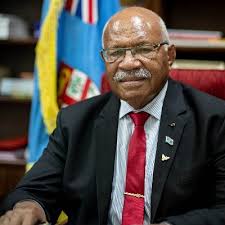In a significant move toward promoting peace and halting conflicts, most leaders across the Pacific have agreed to sign a concept paper aimed at accelerating peace-building actions.
Speaking during Radio Fiji One’s Na Noda Paraiminisita programme, Prime Minister Sitiveni Rabuka emphasised the urgency for Pacific Island leaders to collaborate in addressing pressing issues such as escalating freight costs and the ripple effects of ongoing conflicts like the Russia-Ukraine and Israel-Hamas wars.
Rabuka said the concept paper is set to be presented at the upcoming Pacific Islands Forum meeting scheduled to take place in Tonga in August this year.
The Prime Minister said that once endorsed, the document will be further advocated for at the United Nations General Assembly later this year, emphasiding the collective voice of Pacific Islanders in advocating for peace among nations.
“I will present the concept paper to the United Nations General Assembly, informing the leaders of the world that the Pacific Island leaders have all agreed to peacebuilding and that we need to put a stop to all of these.”
The genesis of this initiative traces back to discussions initiated during the Great Council of Chiefs, where Prime Minister Rabuka called for the inclusion of other Pacific Island monarchs, fostering a unified stance on peace-building efforts.
This collaborative effort among Pacific Island leaders highlights a shared commitment to promoting stability and harmony in the region, voicing the countless individuals directly and indirectly impacted by conflicts worldwide.
Meanwhile, Pacific nations and smaller states are being urged to unite to avoid being caught in the crossfire of a possible nuclear conflict between China and the US.
On the cusp of a new missile age in the Indo-Pacific, a nuclear policy expert suggests countries at the centre of the brewing geopolitical storm must rely on diplomacy to hold the superpowers accountable.
Carnegie Endowment for International Peace’s Ankit Panda said it was crucial smaller states and Pacific nations concerned about potential nuclear conflict “engage in meaningful risk reduction, arms control and broader diplomacy to reduce the possibility of war.”
“States who are not formally aligned with the United States or China were more powerful united,” and this “may create greater incentives for China and the United States to engage in these talks” the think tank’s Nuclear Policy Programme Stanton senior fellow said.
North Korea and the United States have been increasing their inventories of short- to intermediate-range missile systems, he said.
“The stakes are potentially nuclear conflict between two major superpowers with existential consequences for humanity at large.”
The U.S military’s newest long-range hypersonic missile system, called the ‘Dark Eagle’, could soon be deployed to Guam, he said.
A report issued by the Congressional Budget Office last year suggested the missile could potentially reach Taiwan, parts of mainland China, and the North Korean capital of Pyongyang if deployed to Guam, he said.
“Asia and Pacific countries need to put this on the agenda in the way that many European states that were caught in the crossfire between the United States and the Soviet Union were willing to do during the Cold War,” Panda said.
In 2022, North Korea confirmed it had test-launched an intermediate-range ballistic missile capable of reaching Guam.
Guam is a U.S Pacific territory with a population of at least 170,000 people and home to U.S military bases.
Panda said it could be argued that Guam’s unique position and military use by the U.S as a nuclear weapons base makes it even more of a target to North Korea.
He said North Korea will likely intensify its run of missile tests ahead of America’s presidential election in November.
“If [President] Biden is re-elected, they will continue to engage with China in good faith on arms control.
“But if [Donald] Trump gets elected then we can expect the opposite. We’ll see an increase in militarism and a race-to-arms conflict in the Indo-Pacific,” he said.














